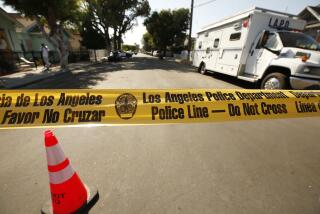Ziggurat Closed After Bomb Threats
- Share via
As the nation marked the one-year anniversary of the Oklahoma City bombing with silence and sadness Friday, Orange County residents found the federal building in Laguna Niguel shuttered because of prank bomb threats.
Officials closed the building Friday after threats to explode bombs at the building were received Thursday, said Mary Filippini, a spokeswoman for the federal General Services Administration, which operates the Chet Holifield Federal Building.
A search of the building, known locally as the Ziggurat, turned up no evidence that a bomb or other device had been planted, Filippini said. But the administration decided to shut the building out of concern for the roughly 3,000 employees and the many residents who visit the building for a variety of services, she said.
Parking lots normally brimming with vehicles were blocked by yellow law enforcement tape and concrete barriers guarded by uniformed federal agents and private security guards.
Irma Jackson of Laguna Niguel, among dozens of people turned away, was shocked that someone would use the bombing tragedy for kicks.
“Someone thought that would be funny, huh?” Jackson speculated before she made a U-turn and put off her business for another day. “That’s a pretty twisted sense of humor.”
The building was scheduled to be reopened Monday.
The government said security was increased at the 7,500 buildings it owns or leases throughout the country.
Elsewhere in the nation, people paused to remember the 168 people who died in the bombing of the Alfred P. Murrah Federal Building in Oklahoma City.
In New York, a stillness pervaded the normally bustling lobby of the Jacob K. Javits Federal Building as hundreds paused in remembrance of the bomb victims. The same silence and sadness could be felt in government buildings across America.
For 168 seconds, one for each victim, the business of running the country came to a halt as workers everywhere, many wearing powder-blue ribbons or badges etched with the word “Remember,” bowed their heads. Church bells tolled, bagpipes played, flags flew at half-staff.
In Washington, the government paused in silent prayer and reflection. The Senate observed the 168 seconds of silence before beginning its daily routine. The House also observed the silence two minutes later.
A Transportation Department ceremony was attended by several hundred employees, many expressing a kinship with those who lost their lives, even if they hadn’t known them.
The Council on American-Islamic Relations marked the date by reporting that Muslims suffered nearly 300 acts of violence and discrimination, much of it a backlash to the bombing, in the year following the Oklahoma City attack.
More than 200 of the incidents occurred in the week after the bombing of the federal building, when Muslims were wrongly blamed in initial reports.
In Englewood, Colo., Timothy J. McVeigh and Terry L. Nichols--the two men charged in the Oklahoma City bombing--spent an ordinary day in jail.
Meanwhile, the surviving members of the Branch Davidians gathered Friday to mark the third anniversary of the federal assault on their compound, which left more than 80 people dead and turned the site into a rubble-strewn shrine for those who believe that the government abuses its power.
The group--about 50 Davidians and their friends, far outnumbered by reporters and photographers--began their commemoration at exactly the moment that Oklahomans and others nationwide marked the first anniversary of the bombing of the Oklahoma City federal building with prayers and tears.
That act of terrorism came two years to the day after an inferno consumed the Davidian compound near Waco, and some believe the bombing was an act of vengeance.
Clive Doyle, a survivor of the Waco inferno, stood amid the ruins of the complex and cried. He said, “We are not here to worship those who died, but we do want to remember them.”
The siege unfolded after agents from the federal Bureau of Alcohol, Tobacco and Firearms tried to arrest cult leader David Koresh on weapons charges. It started with a gun battle that left four federal agents and six cult members dead. It climaxed April 19, 1993, when federal authorities stormed the complex and it erupted in flames. Each side blames the other for the fire.
In Texas City, Texas, authorities shut down a branch of the Houston Ship Channel because two dummy bombs were found outside petrochemical plants after an anonymous caller claiming to be an international terrorist phoned in a threat to an emergency operator.
Traffic was halted on a highway, Loop 197, that winds through the refinery complex, and after-school activities for Texas City’s 6,000 students were canceled.
More to Read
Sign up for Essential California
The most important California stories and recommendations in your inbox every morning.
You may occasionally receive promotional content from the Los Angeles Times.










